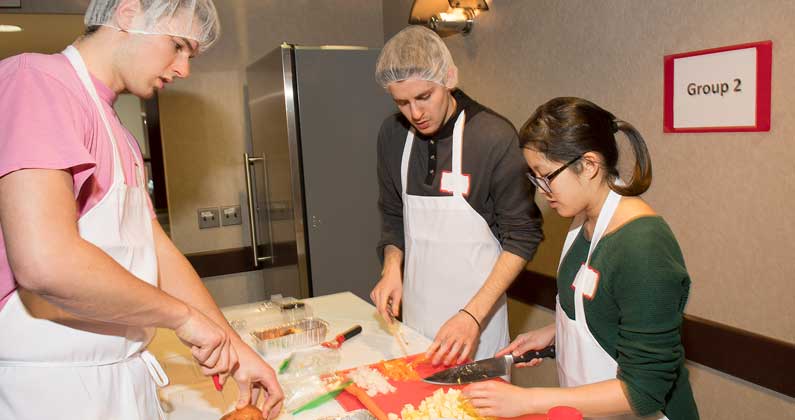PCOM DO Students Swap White Coats for Aprons
March 27, 2018 Doctor of osteopathic medicine students learn the connection between health, nutrition
in new cooking class.
Doctor of osteopathic medicine students learn the connection between health, nutrition
in new cooking class.
First- and second-year doctor of osteopathic medicine (DO) students on the Philadelphia campus are trading in their white coats for white aprons as part of the new Culinary Medicine
elective at Philadelphia College of Osteopathic Medicine (PCOM), designed to teach
the future physicians about diet, nutrition and their ties to wellness, so that they
can in turn share that information with their patients.
The U.S. Department of Health and Human Services reports that roughly 117 million
people, or about half the U.S. population, have one or more preventable chronic illnesses.
Many of them—including heart disease, high blood pressure, diabetes, and certain cancers—are
related to poor diet.
Based on the groundbreaking curriculum founded by the Goldring Center for Culinary Medicine at Tulane University, the four-week
course offers a “practice-what-you-preach approach,” to medical education, says Joanne Kakaty-Monzo, DO ’97, who co-directs the Culinary Medicine program at PCOM.
“Teaching medical students about how to be smart about their diet will help them teach
their patients about it—and how diet goes a long way in preventing disease, not just
treating it,” she said.
Four cohorts take the course one day a week. Because the program is only four weeks,
students have plenty to do outside of class in the form of journal readings, viewing
kitchen safety videos and taking practice quizzes. At the beginning of each class,
students review that work, and then head into their test kitchen to create healthy
meals. During their cooking sessions—led by Chef Budd Cohen, director of dining and
catering services—they learn basic kitchen skills and how to make common dishes (such
as spaghetti and meatballs) in a healthier way.
“We want to give students the tools to guide their patients on how to eat,” said Farzaneh Daghigh, PhD, director of the gastroenterology sciences course and co-director of Culinary Medicine.
“Often, the conversation stops at ‘You would benefit from losing weight.’ But if students
know how to implement little steps to improve diet, that can be incredibly helpful
for their patients.”
Students then gather to eat their healthy meals and review patient case studies similar
to what they would find on their board exams. Not only are they learning about health
and nutrition, they are also preparing for their boards—an important step for any
medical student.
Andrea Weir (DO ’21), president of the Nutrition and Medicine Club, took the class not for the cooking skills—prior to coming to medical school, she
trained in several Michelin-star kitchens in Italy and also worked as a chef—but to
better understand how her knowledge of food could help her be a more effective physician.
“Nutrition plays a part in every aspect of health, both physical and mental,” said
Ms. Weir. “I didn’t want to pass up the opportunity to blend my experience in cooking
with how best to treat my patients."
The first session of Culinary Medicine ends in April, but according to Dr. Daghigh,
interest is quite high among students to join the next session. “We opened the registration
for the course and it filled very quickly, and we have a waiting list with numerous
students,” she said. “We have been hearing very positive things, and hope that we
can continue to expand and improve upon the program.”
You May Also Like:
About Philadelphia College of Osteopathic Medicine
Established in 1899, Philadelphia College of Osteopathic Medicine (PCOM) has trained
thousands of highly competent, caring physicians, health practitioners and behavioral
scientists who practice a “whole person” approach to care—treating people, not just
symptoms. PCOM, a private, not-for-profit accredited institution of higher education,
operates three campuses (PCOM, PCOM Georgia and PCOM South Georgia) and offers doctoral degrees in clinical psychology, educational psychology, osteopathic
medicine, pharmacy, physical therapy, and school psychology. The college also offers
graduate degrees in applied behavior analysis, applied positive psychology, biomedical
sciences, forensic medicine, medical laboratory science, mental health counseling,
physician assistant studies, and school psychology. PCOM students learn the importance
of health promotion, research, education and service to the community. Through its
community-based Healthcare Centers, PCOM provides care to medically underserved populations.
For more information, visit pcom.edu or call 215-871-6100.
Contact Us
For general media inquiries, please contact the Office of Marketing and Communications
at 215-871-6300 or communications@pcom.edu. Visit our media relations page to view contact information for public relations personnel.
Connect with PCOM

 Doctor of osteopathic medicine students learn the connection between health, nutrition
in new cooking class.
Doctor of osteopathic medicine students learn the connection between health, nutrition
in new cooking class.